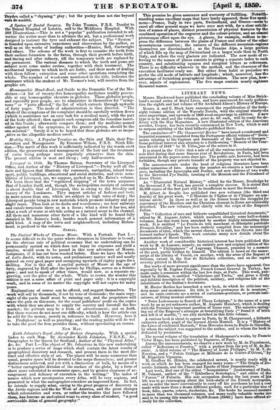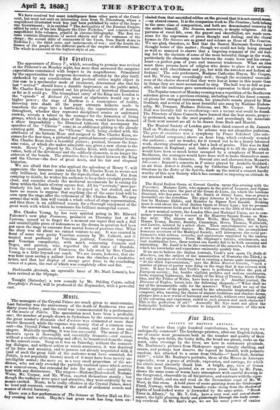LITERARY NEWS.
Messrs. Blackwood have published the concluding volume of Miss Strick- land's second series of Royal Lives, and have announced for early publica- tion the eighth and last volume of Sir Archibald Alison's History of Europe.
Messrs. A. and C. Black have announced the republication of the forty- eight volume edition of the Waverly Novels, with the original ninety-six steel engravings, and upwards of 1000 wood-engravings in addition. A new type is to be used and the volumes, price 48. 6d. each, will be ready for de- livery with the May Magazines. A new illustrated edition of the American novelist, Cooper, has been recently commenced in New York, which is said to surpass anything of the kind hitherto published there. The conductors of" The Commercial Review" have issued a condensed and impartial summary, translated from the Portuguese official volume of" Docu- ments relating to the Capture and Surrender of the Charles et Georges." Some political interest also attaches to a forthcoming "Memoir of the Vene- tian Revolt of 1848" by M. T.Tlloa,;one of the actors in it.
It is stated in the Critic that a sale of all the various revolutionary jour- nals filed during that same famous year of Revolutions, in Paris, had been announced in the papers some days ago. The public sale, however, had been forbidden, though any private transfer of the property was not objected to.
The announcements under the head of religions literature have been rather numerous of late. Among the number we observe a new Concord- ance, including the Apocrypha and Psalter, and new editions of two works by the Reverend Pyc Smith, treating of the Messiah and the Priesthood of Jesus Christ.
An "Illustrated Natural History" edited for the Messrs. Routledge by the Reverend I. G. Wood, has proved a complete success. It is stated that 20,000 copies of the first part will be insufficient to meet the demand.
M. Albert de Broglie has published two new volumes (the third and fourth) of his great work, " L'Histoire de PEglise et de l'Erapire an qua- trieme siècle." In these as well as in the former books the struggles for supremacy of the Heathen and the Christian element in Rome are admirably described. The new volumes_deal chiefly with the reign of the Emperor Julian.
The " Collection of rare and hitherto unpublished historical documents," edited by M. Auguste Aubry, which numbers already some half-a-dozen volumes, has this week been enriched by another highly interesting little work. It is entitled "Le Frock du tre.s meechant et detestable parricide Francois Ravaillac," and has been entirely compiled from the manuscript documents of trial, which the merest chance' it is said, has thrown into e learned author's hands. The work contains many new details about the assassination of Henri Quatre.
Another work of considerable historical interest has been published this week by M. de Lescure, namely' an entirely new and original edition of the celebrated " Philippiques " of Lagrange 'Chancel, preceded by a memoir of the poet, partly written by himself. The edition is based on the manu- script of the library of Vesoul, on another, with the arms of the Regent of Orleans, extant in the Rue de Richelieu collection, and on the copies secretly printed in Holland. But works of more present significance than the above have appeared. One especially by M. Eugene Poujade, French Consul General in Turkey, has made quite a sensation within the last few days, at Paris. This work, pub- lished by Didion, is entitled "Christians and Turks," and gives a lively and faithful description of the political, military, and religious life of the inhabitants of the Sultan's dominions.
M. Hector Berlioz has launched a new book, in which he criticises mo- dern music and musicians. Its title is "Lee grotesques de la musique," and its main contents are a series of caricature-portraits, or portrait-cari- catures, of living musical celebrities.
"Peter Ladronneau in Search of Cheap Lodgings," is the name of a new work by an as yet unknown author, M. Auguste Humbert, which is dealing with the Parisian's important question of house rent. The miseries spring- big out of the Emperor's attempts at beautifying Paris (" found it of brick and left it of marble,") are ably sketched in this little volume.
A curious book is about to appear in Paris, by M. Charguemud, a hitherto unknown author, pupil of the learned Alexis MonteiL It is a "History of the Lives of celebrated Bastards," from Hercules down to Emile de Girardin, by whom the subject was suggested to the author, and to whom the book is dedicated by permission.
The second volume of the translation of Shakespeare's works, by Francis Victor Hugo, has been published by Pagnerre, of Paris. Among the announcements, we observe a new work by M. de Fiquelmont, called " Refiexions et Pensies," with a preface from the pen of M. de Ba- rante. A third volume of "The History of Louis Philippe," by M. V. de Nouvion, and a "Precis Critique et Militaire de In Guerre d'Orient," M. Hippolyte Vigneron. M. Geoffrey St. Hilaire, the celebrated savant, is nearly ready with a work on which he has been engaged for many years—" The Origin of Do- mestic Animals, and the Places and Epochs of their Domestication. Last week, died one of the oldest " bouquinistes " (bookworms) of Paris, M. Veinant, author of the " Bibliotheca Scatologica,' and editor of the " Farces " of Fabarin. His sole occupation during the last years of his life was to go rummaging about the book-stalls of the French metropolis, and in order the More conveniently to carry off his purchases he had a coat made with more than a dozen different pockets, each for a particular eke of book, folio, quarto, octavo, duodecimo, &c. The books he amassed amount to more than ten thousand volumes, and many really valuable works are said to be among this number; 85,000 franca (34001.) have been offered al- ready for the collection. We have received but scant intelligence from other parts of the Conti- nent, but must not omit an interesting item from St. Petersburg, where a magnificent illustrated work has just been published by order of the Impe- rial Government ; it is entitled "The Antiquities of the Russian Empire, edited by order of his late Majesty the Czar Nicholas," and consists of four magnificent folio volumes, printed in chrome-lithography. The first vo- lume contains illustrations of sacred objects and of the oostumes of the clergy ; the second ditto of ornaments of the exam, from Bunk down to Nicholas I.; the third arms and instruments of war ; and the fourth the dresses of the people of the different parts of the empire at different times. The whole is executed in the highest style of art.



























 Previous page
Previous page